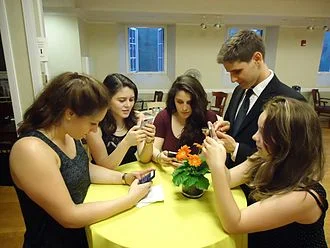Llewellyn King: Notebook --The new publishing giants; failing upwards; U.S. gastronomic capital?
When A.J. Liebling said that freedom of the press meant freedom for those who owned the presses, he spoke in a time when there were nearly 2,000 daily newspapers in the United States. Today there are fewer, and they depend on more than presses to stay in business. They depend on the indulgence of Google, Facebook and Twitter.
Freedom of the press now depends on those few companies that own the algorithms on which all publishers depend to get a wider range of readers, even while making no money off them.
The newsboys and newsgirls of yesterday delivered the papers. That is all. The news deliverers of today control the whole publishing world. They can determine success or failure and, as we are seeing, have the power to censor.
William Horsley, a retired BBC correspondent who is involved with media studies at the University of Sheffield and is vice president of the Association of European Journalists, says that the newsboys are now the publishers.
In the billions of words that have been spouted about freedom of the press here and around the globe, Horsley has identified a new and terrible reality about the freedom of the press and along with it, the freedom of ideas.
Quite simply, we now live in an era in which an algorithm buried somewhere in the secret depths of Google can do more to change what we know, think and say than any dictator has been able to achieve.
While the creators of Google, Facebook and Twitter probably did not dream of such power, such control, such hegemony, it has come to them.
The mind reels with possibilities, each more disturbing than the previous, of what would happen if any of the Internet giants fell into the hands of malicious owners or a dictator. Think of the damage if Steve Bannon, who presides over Breitbart, or some like ideologue, were at the helm of Google, Facebook or Twitter.
George Orwell, at his most pessimistic, could not have imagined the existential evil that could await us, courtesy of technology, plus a sociopath.
Dumb Luck, Sir. Dumb Luck.
A professor at Brown University congratulates me on my life choices. He implies that my peripatetic journey through the world, clutching a press card, has been because of sound choices. To which I have to respond, “My life has been one of dumb luck and failure.”
Luck, I say, because it is what determines your being at the right place at the right time. Failure, I say, because it is possible to fail upwards: I have, often.
Had my career been on an even keel, I would have finished high school, maybe gone to university and then gotten stuck in one of the early jobs, making it my “career.” As it is, I dropped out of high school, went into journalism and failed a lot.
If I had kept any of those jobs I failed at, I might have had a duller life: a jobbing writer in Africa, a news writer at ITN in London, the creator of America's first women's liberation magazine (which failed to liberate any women, but liberated all my money) in New York, an assistant editor at The Washington Post, and a trade journal reporter at McGraw-Hill.
So, Mr. Professor, I recommend that you prepare students for the success of failing upwards. Sometimes that goes for relationships and marriages. Do not bivouac too early on life’s open road.
The Gastronomic Capital of the U.S.: Is it Rhode Island?
In France, it is pretty well agreed, the area around Lyon is the gastronomic capital.
In the United States, New Orleans is mentioned. Well I have eaten many a meal in New Orleans, especially during a time when I was making a lot of speeches at conventions in New Orleans. But I have to say that good food rolls in Rhode Island. So much so that smart visitors come to Li'l Rhody on gastronomic tours, including friends of mine, who, like myself, have eaten the world over.
Now there are a few quibbles, to be sure. One big one is that there are woefully few French restaurants in the state, and the Italian influence in the restaurants is pervasive. Also I think that there could be more top-of-the line and regional Chinese restaurants, although a Uighur restaurant has just opened in Providence. Other Asian cuisines -- Korean, Indian, Thai and Japanese -- are well represented.
Still, the eating in the Ocean State leaves New Orleans with a way to go in my book.
{Editor’s Note: Rhode Island does have a few good French restaurants, such as Chez Pascal, on Hope Street in Providence.}
Llewellyn King (llewellynking1@gmail.com) is executive producer and host of White House Chronicle, on PBS.
